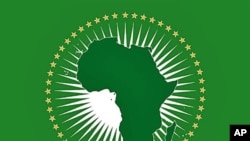Africa’s unlimited potential was on display this week as 300 "movers and shakers" (influential) of tomorrow gathered to prepare to address today’s leaders at a continental summit in June.
It takes only a glance at the television news to realize young people are driving the change sweeping Africa. On a continent where nearly two-thirds of the people are under 20, the "old guard" is on the way out.
With that fact clearly in mind, the African Union has chosen Empowering Youth as the theme of its June summit in Equatorial Guinea’s capital, Malabo. They have invited a selection of Africa’s brightest young people to tell the assembled heads of state what is on their collective mind.
Twenty-something Ghanaian attorney Yvonne Darkwa-Poku typifies the group assembled at AU headquarters this week to draft the youth proposal.
"This is a new breed of young Africans. We have shown evidence from what we’ve done in Egypt, from what we did in Tunisia, from what we’re dying for in Libya and Cote d’Ivoire [Ivory Coast]. Most of us, a lot of us have been educated abroad, so we have that comparative advantage of life in the West, to be productive in the West, and what it means to live here. We have both," Darkwa-Poku said.
Darkwa-Poku earned her law degree from American University in Washington. Like many young Africans, she sees her future in her native land. But, for the moment, she runs a legal counseling firm in the American city, Pittsburgh, working with victims of human trafficking.
She is concerned that leaders at the Malabo summit get a clear message about the evils of modern day slavery.
"We are not like our leaders. We are strong enough to push the envelope of new kinds of leadership, innovation, and information technology and, my field, to fight human rights abuses such as human trafficking,” Darkwa-Poku explains. “It is estimated 200,000 African youth fall victim to ruthless traffickers looking for vulnerable victims who are unemployed, desperate for a better life, who have a fantasy of greener pastures abroad. They look for these victims to exploit. In our outcome document we have a commitment to combat gender violence and trafficking."
But even the most idealistic youth understand the enormity of the task before them in improving the lives of one billion-plus Africans.
One speaker at this brainstorming session, U.S. Ambassador to the African Union Michael Battle, was besieged with questions about how countries like the United States could take a more prominent role in speeding up the pace of transforming Africa.
Ambassador Battle says he told his questioners, although outsiders are willing to support them, it is up to energetic young Africans like themselves to make their vision a reality. "The kind of action they want can never take place unless they push it,” he states. “They want action pushed, but they want some other people to help them push it, and I will say, 'No, you have to push it. You have to be the engine, then we will support you in the process'."
Yvonne Dwarka-Poku says young Africans want to tell the Malabo summit they want governments to lead, but are no longer willing to sit back and wait for the state to act.
"One of the great things coming out of this Africa youth forum is a realization or acceptance that we cannot depend on government for everything we need. Most of the time it’s government this, government that, but we’ve been echoing the same solution,” she said. “Let’s mobilize and be a collective voice, and with that we’ll have more impact than just waiting for government handouts."
The conference organizer, African Union Science and Technology Director Vera Brenda Ngosi says the days are gone when a country's leaders would dictate to the youth. She says today's African youth know where they want to drive their continent.




